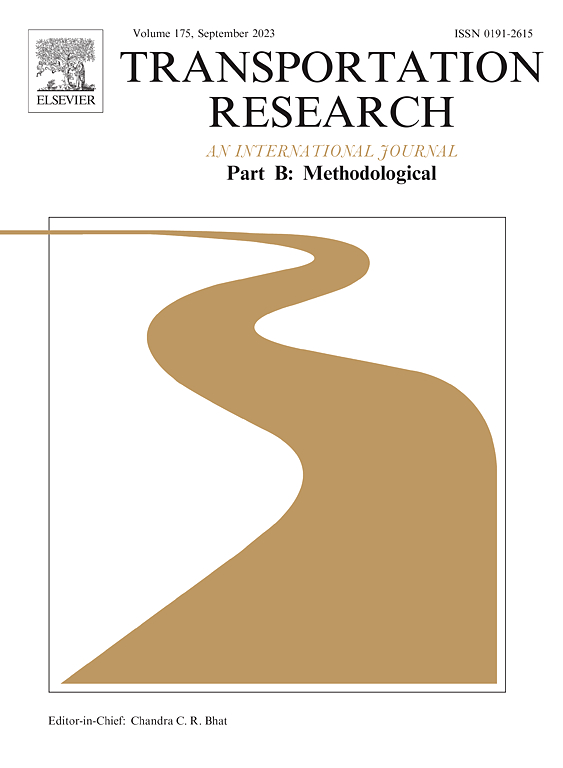随机需求和瓶颈容量下的部分和全部出行前信息的价值
IF 6.3
1区 工程技术
Q1 ECONOMICS
引用次数: 0
摘要
本文研究了在单瓶颈模型下,向早晨通勤者提供出行前信息的福利效应,其中瓶颈容量和出行需求都是外生随机的,并假设服从任意联合分布。本文首先推导了不同信息完备性水平下的均衡出行成本,然后考察了信息完备性如何影响出行成本以及驱动信息提供福利结果的关键因素。研究发现,提供出行前信息的福利效应与信息完备性、瓶颈容量与需求的相关程度、瓶颈容量与需求变化的频率和幅度有关。尽管提供全部信息永远不会减少福利,但当需求和瓶颈容量适度相关时,提供部分信息比不提供信息(即信息悖论)会增加旅行成本。然而,从部分信息过渡到完全信息始终导致旅行费用的减少。我们的数值例子进一步证实了理论结果,并强调了在开发出行者信息系统时考虑供需不确定性的必要性。本文章由计算机程序翻译,如有差异,请以英文原文为准。
The value of partial and full pre-trip information under stochastic demand and bottleneck capacity in the morning commute
This paper studies the welfare effects of providing pre-trip information to morning commuters in a single-bottleneck model, where both bottleneck capacity and travel demand are exogenously stochastic and assumed to follow an arbitrary joint distribution. We first derive the equilibrium travel costs under varying levels of information completeness, and then examine how information completeness influences travel costs and the key factors driving the welfare outcomes of information provision. We find that the welfare effects of providing pre-trip information are associated with the information completeness, the degree of correlation between bottleneck capacity and demand, and the frequency and amplitude of bottleneck capacity and demand changes. Although providing full information is never welfare-reducing, providing partial information can increase travel costs compared to no information (i.e., information paradox) when demand and bottleneck capacity are moderately correlated. Nevertheless, transitioning from partial to full information consistently leads to a reduction in travel costs. Our numerical examples further confirm the theoretical results and highlight the necessity of accounting for uncertainties in both supply and demand when developing traveler information systems.
求助全文
通过发布文献求助,成功后即可免费获取论文全文。
去求助
来源期刊
CiteScore
12.40
自引率
8.80%
发文量
143
审稿时长
14.1 weeks
期刊介绍:
Transportation Research: Part B publishes papers on all methodological aspects of the subject, particularly those that require mathematical analysis. The general theme of the journal is the development and solution of problems that are adequately motivated to deal with important aspects of the design and/or analysis of transportation systems. Areas covered include: traffic flow; design and analysis of transportation networks; control and scheduling; optimization; queuing theory; logistics; supply chains; development and application of statistical, econometric and mathematical models to address transportation problems; cost models; pricing and/or investment; traveler or shipper behavior; cost-benefit methodologies.

 求助内容:
求助内容: 应助结果提醒方式:
应助结果提醒方式:


